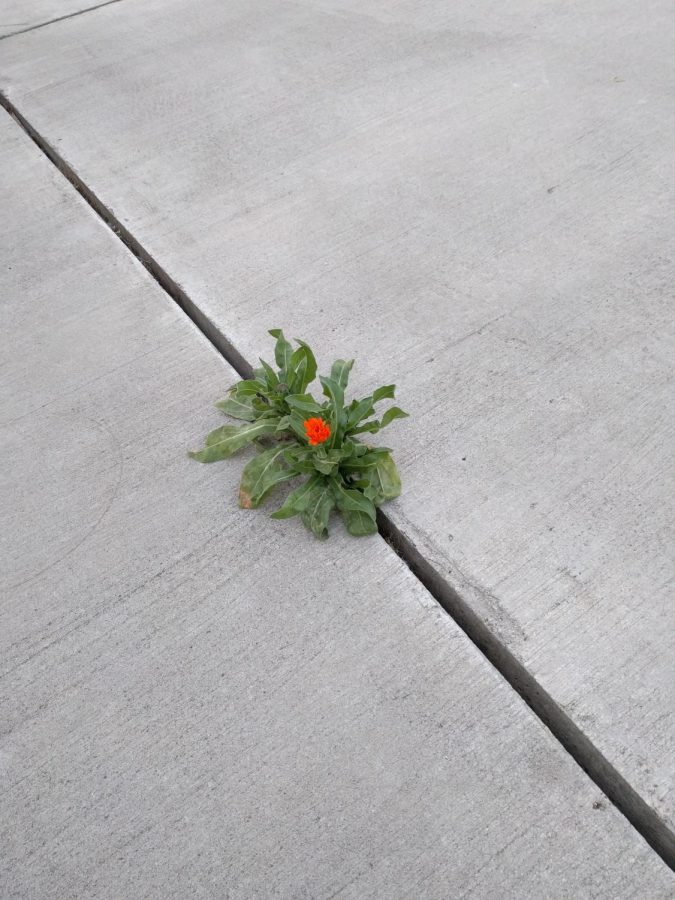My grandma died and my relationship ended… Now what?
Finding acceptance through grief.
January 25, 2023
While the headline may lead you to believe I’m writing a melancholy country ballad, in reality I’m just trying to walk a straight line down a spiral path.
Grief is a peculiar thing, because I’ve never felt so alone, yet so haunted by the spirits of others. I say haunted not because the people in my life who cause grief (both living and dead) have malintention of a spooky sort, but because when I walk down the street, I see them there, when I hear a song that reminds me of them, I miss their presence and when I go to sleep and wake up, they are sitting on top of my heart.
Grief has five stages according to Elisabeth Kübler-Ross, the psychologist who coined this concept in her 1969 book “On Death and Dying.” These stages are: denial, anger, bargaining, depression and acceptance.
Bargaining has always felt the most ferocious to me. We try so hard to imagine a different outcome, to trace our steps to the root of our despair and to mentally reinvent our choices so that things could have turned out more favorably. We wonder, if I did this, would they have stayed? If I did less of that, would we have had more time?
The crux of bargaining? It keeps you in a loop of impossible alternate realities that have little more use than torture.
So, how does one slay the tendency to bargain? Perhaps with what is called the fifth stage: acceptance. However, it’s not such a linear pattern. Many in my life have compassionately told me that the five stages will visit and revisit at any time or order they please. The coveted fifth stage may come and go, leave and stay, but it is always there inside of us, waiting to be activated, waiting to find space amidst the chaos.
Acceptance may look like screaming into a pillow or acceptance may look like forgetting to think about your trauma first thing in the morning. Acceptance isn’t some untouchable, emotionless thing. How I see acceptance is this: the ability to move and adapt not in spite of your emotions, but because of them.
Everybody expresses and shares differently. In my life, I write articles and poetry, I dance and sing. In order to do these enriching activities, I must confront the loss I’ve faced. I had a partner for three years, and we performed and wrote songs together (ironically, one of our songs is titled “The Fifth Stage.”) We shared families, we raised dogs and in the end we hurt each other trying to hang on too long to something that no longer served us.
So much of my identity was entwined in this relationship, as was also the case with my grandma who passed away a week before we published our first issue this quarter. That week, I wrote three memorial articles: one for my grandma’s obituary, and two honoring departed CWU community members. Death was inescapable.
My grandma Pasqualina was one of my last links to my Italian heritage. She was the reason my ancestors settled in Ellensburg, which is where I was born and have resided my whole life. She helped raise me. So how does one move on when seemingly their entire existence and identity was enmeshed with living beings who are no longer present (at least not in the same capacity)?
With grace? With courage? With a warm conversation or a book that feels like a cradle? Or maybe, none of that is necessary to start. Maybe acceptance starts from space – allowing yourself space to fully feel, allowing yourself space to be angry, disappointed, humiliated, in anguish. Allowing yourself space to feel the ugliness life has to offer, instead of avoiding it through substance use, excessive consumption or other forms of suppression. Acceptance starts from allowing others to witness you struggling within this space, to see you in your vulnerability and, if well-surrounded, to show you that they will love you even when you don’t love yourself.
This support can be found in therapy, it can be found in sobriety programs where grief is often a root cause of the issue, it can be found among friends, family, pets or strangers, and most importantly, it is waiting to be tapped into within your own pen, your own writing hand.
Nobody can write to you like you can. It takes practice, it takes discipline, but in the end, your own journal entries have the potential to provide the best advice you can get. Writing to yourself will show you your habits, it will show you what creates tension in your life, it will show you what you try to hide from. It may feel physically painful, like an anvil on the chest, but when the ink settles on the page, you may realize: this is where my strength lies. This is where my acceptance was living, and now I choose to live there too.
Sit with yourself, grab a pen and paper, and feel into your heart. Place your hand on your chest. Say out loud, “I accept myself. I am enough.” From there, imagine your heart is a ball of light, ask that light what it wants to say and write away. It may take time for the words to come. Give yourself all the time you need. Don’t judge it or limit it or call it not good enough. Say it again if the doubt creeps in: “I accept myself. I am enough.”
Journaling doesn’t cure grief, no one thing does. Ultimately, grief has no cure because it doesn’t need one. Grief itself is the cure to loss. Letting it out into the world is one way to let go of your attachment to it.

